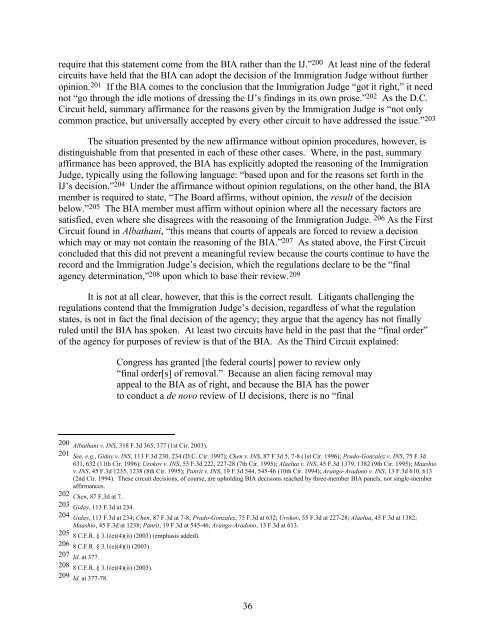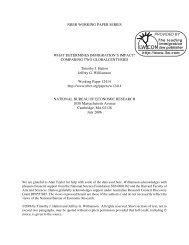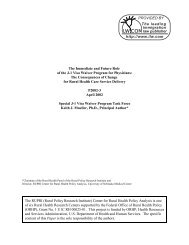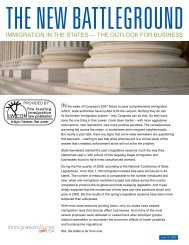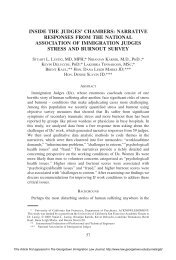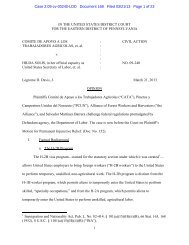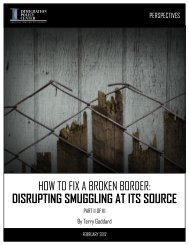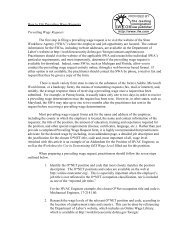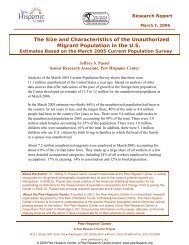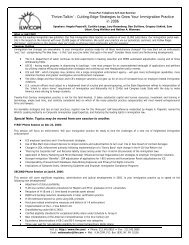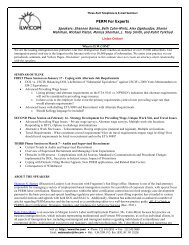Study of Board of Immigration Appeals Procedural Reforms - ILW.com
Study of Board of Immigration Appeals Procedural Reforms - ILW.com
Study of Board of Immigration Appeals Procedural Reforms - ILW.com
You also want an ePaper? Increase the reach of your titles
YUMPU automatically turns print PDFs into web optimized ePapers that Google loves.
equire that this statement <strong>com</strong>e from the BIA rather than the IJ.” 200 At least nine <strong>of</strong> the federal<br />
circuits have held that the BIA can adopt the decision <strong>of</strong> the <strong>Immigration</strong> Judge without further<br />
opinion. 201 If the BIA <strong>com</strong>es to the conclusion that the <strong>Immigration</strong> Judge “got it right,” it need<br />
not “go through the idle motions <strong>of</strong> dressing the IJ’s findings in its own prose.” 202 As the D.C.<br />
Circuit held, summary affirmance for the reasons given by the <strong>Immigration</strong> Judge is “not only<br />
<strong>com</strong>mon practice, but universally accepted by every other circuit to have addressed the issue.” 203<br />
The situation presented by the new affirmance without opinion procedures, however, is<br />
distinguishable from that presented in each <strong>of</strong> these other cases. Where, in the past, summary<br />
affirmance has been approved, the BIA has explicitly adopted the reasoning <strong>of</strong> the <strong>Immigration</strong><br />
Judge, typically using the following language: “based upon and for the reasons set forth in the<br />
IJ’s decision.” 204 Under the affirmance without opinion regulations, on the other hand, the BIA<br />
member is required to state, “The <strong>Board</strong> affirms, without opinion, the result <strong>of</strong> the decision<br />
below.” 205 The BIA member must affirm without opinion where all the necessary factors are<br />
satisfied, even where she disagrees with the reasoning <strong>of</strong> the <strong>Immigration</strong> Judge. 206 As the First<br />
Circuit found in Albathani, “this means that courts <strong>of</strong> appeals are forced to review a decision<br />
which may or may not contain the reasoning <strong>of</strong> the BIA.” 207 As stated above, the First Circuit<br />
concluded that this did not prevent a meaningful review because the courts continue to have the<br />
record and the <strong>Immigration</strong> Judge’s decision, which the regulations declare to be the “final<br />
agency determination,” 208 upon which to base their review. 209<br />
It is not at all clear, however, that this is the correct result. Litigants challenging the<br />
regulations contend that the <strong>Immigration</strong> Judge’s decision, regardless <strong>of</strong> what the regulation<br />
states, is not in fact the final decision <strong>of</strong> the agency; they argue that the agency has not finally<br />
ruled until the BIA has spoken. At least two circuits have held in the past that the “final order”<br />
<strong>of</strong> the agency for purposes <strong>of</strong> review is that <strong>of</strong> the BIA. As the Third Circuit explained:<br />
Congress has granted [the federal courts] power to review only<br />
“final order[s] <strong>of</strong> removal.” Because an alien facing removal may<br />
appeal to the BIA as <strong>of</strong> right, and because the BIA has the power<br />
to conduct a de novo review <strong>of</strong> IJ decisions, there is no “final<br />
200 Albathani v. INS, 318 F.3d 365, 377 (1st Cir. 2003).<br />
201 See, e.g., Giday v. INS, 113 F.3d 230, 234 (D.C. Cir. 1997); Chen v. INS, 87 F.3d 5, 7-8 (1st Cir. 1996); Prado-Gonzalez v. INS, 75 F.3d<br />
631, 632 (11th Cir. 1996); Urokov v. INS, 55 F.3d 222, 227-28 (7th Cir. 1995); Alaelua v. INS, 45 F.3d 1379, 1382 (9th Cir. 1995); Maashio<br />
v. INS, 45 F.3d 1235, 1238 (8th Cir. 1995); Panrit v. INS, 19 F.3d 544, 545-46 (10th Cir. 1994); Arango-Aradono v. INS, 13 F.3d 610, 613<br />
(2nd Cir. 1994). These circuit decisions, <strong>of</strong> course, are upholding BIA decisions reached by three-member BIA panels, not single-member<br />
affirmances.<br />
202 Chen, 87 F.3d at 7.<br />
203 Giday, 113 F.3d at 234.<br />
204 Giday, 113 F.3d at 234; Chen, 87 F.3d at 7-8; Prado-Gonzalez, 75 F.3d at 632; Urokov, 55 F.3d at 227-28; Alaelua, 45 F.3d at 1382;<br />
Maashio, 45 F.3d at 1238; Panrit, 19 F.3d at 545-46; Arango-Aradono, 13 F.3d at 613.<br />
205 8 C.F.R. § 3.1(e)(4)(ii) (2003) (emphasis added).<br />
206 8 C.F.R. § 3.1(e)(4)(i) (2003).<br />
207 Id. at 377.<br />
208 8 C.F.R. § 3.1(e)(4)(ii) (2003).<br />
209 Id. at 377-78.<br />
36


